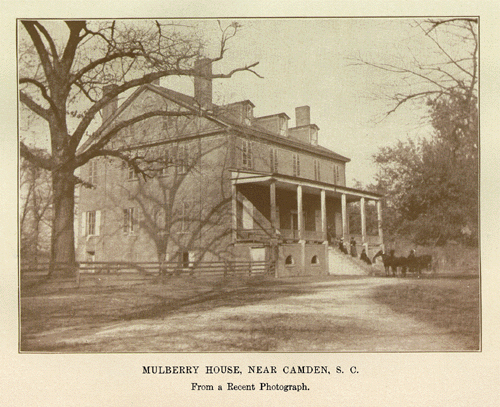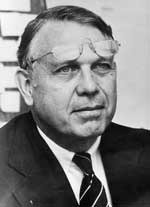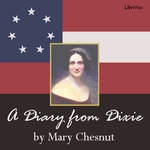A Diary From Dixie, Chapter 10
Page 127
X. CAMDEN, S. C.
September 9, 1861-September 19, 1861
CAMDEN, S. C., September 9,1861. - Home again at Mulberry, the fever in full possession of me. My sister, Kate, is my ideal woman, the most agreeable person I know in the world, with her soft, low, and sweet voice, her graceful, gracious ways, and her glorious gray eyes, that I looked into so often as we confided our very souls to each other.
God bless old Betsey's yellow face! She is a nurse in a thousand, and would do anything for "Mars Jeems' wife." My small ailments in all this comfort set me mourning over the dead and dying soldiers I saw in Virginia. How feeble my compassion proves, after all.
I handed the old Colonel a letter from his son in the army. He said, as he folded up the missive from the seat of war, "With this war we may die out. Your husband is the last - of my family." He means that my husband is his only living son; his grandsons are in the army, and they, too, may be killed - even Johnny, the gallant and gay, may not be bullet-proof. No child have I.
Now this old man of ninety years was born when it was not the fashion for a gentleman to be a saint, and being lord of all he surveyed for so many years, irresponsible, in the center of his huge domain, it is wonderful he was not a greater tyrant - the softening influence of that angel wife, no doubt. Saint or sinner, he understands the world about him - au fond.
Page 128
Have had a violent attack of something wrong about my heart. It stopped beating, then it took to trembling, creaking and thumping like a Mississippi high-pressure steamboat, and the noise in my ears was more like an ammunition wagon rattling over the stones in Richmond. That was yesterday, and yet I am alive. That kind of thing makes one feel very mortal.
Russell writes how disappointed Prince Jerome Napoleon was with the appearance of our troops, and "he did not like Beauregard at all." Well! I give Bogar up to him. But how a man can find fault with our soldiers, as I have seen them individually and collectively in Charleston, Richmond, and everywhere - that beats me.
The British are the most conceited nation in the world, the most self-sufficient, self-satisfied, and arrogant. But each individual man does not blow his own penny whistle; they brag wholesale. Wellington - he certainly left it for others to sound his praises - though Mr. Binney thought the statue of Napoleon at the entrance of Apsley House was a little like " 'Who killed Cock Robin?' 'I, said the sparrow, with my bow and arrow.' " But then it is so pleasant to hear them when it is a lump sum of praise, with no private crowing - praise of Trafalgar, Waterloo, the Scots Greys.
Fighting this and fighting that, with their crack corps stirs the blood and every heart responds - three times three! Hurrah!
But our people feel that they must send forth their own reported prowess: with an, "I did this and I did that." I know they did it; but I hang my head.
In those Tarleton Memoirs, in Lee's Memoirs, in Moultrie's, and in Lord Rawdon's letters, self is never brought to the front. I have been reading them over and admire their modesty and good taste as much as their courage and cleverness. That kind of British eloquence takes me. It is not, "Soldats! marchons, gloire!" Not a bit of it; but,
Page 128a

MULBERRY HOUSE, NEAR CAMDEN, S. C.
From a Recent Photograph.
Page 129
"Now, my lads, stand firm!" and, "Now up, and let them have it!"
Our name has not gone out of print. To-day, the Examiner, as usual, pitches into the President. It thinks Toombs, Cobb, Slidell, Lamar, or Chesnut would have been far better in the office. There is considerable choice in that lot. Five men more utterly dissimilar were never named in the same paragraph.
September 19th. - A painful piece of news came to us yesterday - our cousin, Mrs. Witherspoon, of Society Hill, was found dead in her bed. She was quite well the night before. Killed, people say, by family sorrows. She was a proud and high-strung woman. Nothing shabby in word, thought, or deed ever came nigh her. She was of a warm and tender heart, too; truth and uprightness itself. Few persons have ever been more loved and looked up to. She was a very handsome old lady, of fine presence, dignified and commanding.
"Killed by family sorrows," so they said when Mrs. John N. Williams died. So Uncle John said yesterday of his brother, Burwell. "Death deserts the army," said that quaint old soul, "and takes fancy shots of the most eccentric kind nearer home."
The high and disinterested conduct our enemies seem to expect of us is involuntary and unconscious praise. They pay us the compliment to look for from us (and execrate us for the want of it) a degree of virtue they were never able to practise themselves. It is a crowning misdemeanor for us to hold still in slavery those Africans whom they brought here from Africa, or sold to us when they found it did not pay to own them themselves. Gradually, they slid or sold them off down here; or freed them prospectively, giving themselves years in which to get rid of them in a remunerative way. We want to spread them over other lands, too - West and South, or Northwest, where the climate would free them or kill them, or improve them out
Page 130
of the world, as our friends up North do the Indians. If they had been forced to keep the negroes in New England, I dare say the negroes might have shared the Indians' fate, for they are wise in their generation, these Yankee children of light. Those pernicious Africans! So have just spoken Mr. Chesnut and Uncle John, both ci-devant Union men, now utterly for State rights.
It is queer how different the same man may appear viewed from different standpoints. "What a perfect gentleman," said one person of another; "so fine-looking, high-bred, distinguished, easy, free, and above all graceful in his bearing; so high-toned! He is always indignant at any symptom of wrong-doing. He is charming - the man of all others I like to have strangers see - a noble representative of our country." "Yes, every word of that is true," was the reply. "He is all that. And then the other side of the picture is true, too. You can always find him. You know where to find him! Wherever there is a looking-glass, a bottle, or a woman, there will he be also." "My God! and you call yourself his friend." "Yes, I know him down to the ground."
This conversation I overheard from an upper window when looking down on the piazza below - a complicated character truly beyond La Bruyère - with what Mrs. Preston calls refinement spread thin until it is skin-deep only.
An iron steamer has run the blockade at Savannah. We now raise our wilted heads like flowers after a shower. This drop of good news revives us.1
1. By reason of illness, preoccupation in other affairs, and various deterrent causes besides, Mrs. Chesnut allowed a considerable period to elapse before making another entry in her diary.











